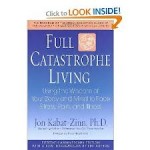 Based on Dr. Jon Kabat-Zinn’s renowned mindfulness-based stress reduction program, this book shows you how to use natural, medically proven methods to soothe and heal your body, mind, and spirit. The title? Oh, that’s from the classic book Zorba the Greek. Zorba is a Greek full of a salty zest for life. At one point, his intellectual benefactor asked him, “Zorba, are you married?” Zorba snorts, “Married? Wife, kids, house . . . the full catastrophe!” When all of our lives are pulled about by the catastrophe of daily living, we need mindfulness to ground us, we need the deep breathing and quiet to enrich the quiets place in all of us.
Based on Dr. Jon Kabat-Zinn’s renowned mindfulness-based stress reduction program, this book shows you how to use natural, medically proven methods to soothe and heal your body, mind, and spirit. The title? Oh, that’s from the classic book Zorba the Greek. Zorba is a Greek full of a salty zest for life. At one point, his intellectual benefactor asked him, “Zorba, are you married?” Zorba snorts, “Married? Wife, kids, house . . . the full catastrophe!” When all of our lives are pulled about by the catastrophe of daily living, we need mindfulness to ground us, we need the deep breathing and quiet to enrich the quiets place in all of us.
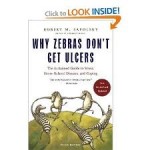 Dr. Robert M. Sapolsky has chapters on how stress affects sleep and addiction, as well as new insights into anxiety and personality disorder and the impact of spirituality on managing stress.
Dr. Robert M. Sapolsky has chapters on how stress affects sleep and addiction, as well as new insights into anxiety and personality disorder and the impact of spirituality on managing stress.
As Sapolsky explains, most of us do not lie awake at night worrying about whether we have leprosy or malaria. Instead, the diseases we fear-and the ones that plague us now-are illnesses brought on by the slow accumulation of damage, such as heart disease and cancer. When we worry or experience stress, our body turns on the same physiological responses that an animal’s does, but we do not resolve conflict in the same way-through fighting or fleeing. Over time, this activation of a stress response makes us literally sick.
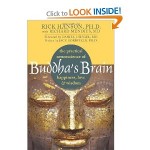 Jesus, Moses, the Buddha, and other great teachers were born with brains built essentially like anyone else’s, but used their minds to change their brains in ways that changed history. With the new breakthroughs in neuroscience, combined with the insights from thousands of years of contemplative practice, this book shows readers how to have greater emotional balance in turbulent times, as well as healthier relationships, more effective actions, and a deeper religious or spiritual practice. It’s full of practical tools and skills readers can use in daily life to tap the unused potential of the brain and rewire it over time for greater peace and well-being.
Jesus, Moses, the Buddha, and other great teachers were born with brains built essentially like anyone else’s, but used their minds to change their brains in ways that changed history. With the new breakthroughs in neuroscience, combined with the insights from thousands of years of contemplative practice, this book shows readers how to have greater emotional balance in turbulent times, as well as healthier relationships, more effective actions, and a deeper religious or spiritual practice. It’s full of practical tools and skills readers can use in daily life to tap the unused potential of the brain and rewire it over time for greater peace and well-being.
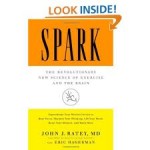 This book offers a fascinating investigation into the transformative effects of exercise on the brain, from the bestselling author and renowned psychiatrist John J. Ratey, MD. Did you know you can beat stress, lift your mood, fight memory loss, sharpen your intellect, and function better than ever simply by elevating your heart rate and breaking a sweat? The evidence is incontrovertible: Aerobic exercise physically remodels our brains for peak performance. This is one of the few books that got me off my ass and into the gym.
This book offers a fascinating investigation into the transformative effects of exercise on the brain, from the bestselling author and renowned psychiatrist John J. Ratey, MD. Did you know you can beat stress, lift your mood, fight memory loss, sharpen your intellect, and function better than ever simply by elevating your heart rate and breaking a sweat? The evidence is incontrovertible: Aerobic exercise physically remodels our brains for peak performance. This is one of the few books that got me off my ass and into the gym.
This is a short book and easy to read. Jan Chozen Bays, M.D., a physician and Zen teacher, has developed a series of simple practices to help us cultivate mindfulness as we go about our ordinary, daily lives. Exercises include: taking three deep breaths before answering the phone, noticing and adjusting your posture throughout the day, eating mindfully, and leaving no trace of yourself after using the kitchen or bathroom. Each exercise is presented with tips on how to remind yourself and a short life lesson connected with it.
The Relaxation and Stress Reduction Workbook
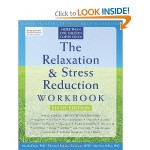 This book details easy, step-by-step techniques for calming the body and mind in an increasingly overstimulated world. It’s based on the latest research, and draws from a variety of proven treatment methods, including progressive relaxation, autogenics, self-hypnosis, visualization, and mindfulness and acceptance therapy. In the first chapter, you’ll explore your own stress triggers and symptoms, and learn how to create a personal plan for stress reduction. Each chapter features a different method for relaxation and stress reduction, explains why the method works, and provides on-the-spot exercises you can do to apply that method when you feel stressed.
This book details easy, step-by-step techniques for calming the body and mind in an increasingly overstimulated world. It’s based on the latest research, and draws from a variety of proven treatment methods, including progressive relaxation, autogenics, self-hypnosis, visualization, and mindfulness and acceptance therapy. In the first chapter, you’ll explore your own stress triggers and symptoms, and learn how to create a personal plan for stress reduction. Each chapter features a different method for relaxation and stress reduction, explains why the method works, and provides on-the-spot exercises you can do to apply that method when you feel stressed.
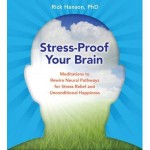 Our brains have evolved powerful tools for coping with threats and danger-but in the face of modern stresses like information overload, money worries, and interpersonal conflicts, our survival reflexes can do more harm than good. To help you adapt your nervous system to the challenges of today’s world, neuropsychologist Dr. Rick Hanson presents Stress-Proof Your Brain. Join him to learn research-based techniques and meditations that will literally re-shape your brain to make you more resilient, confident, and peaceful, including: – How to replace your brain’s unhealthy reactions to stress with protective and self-nurturing responses- Techniques for using memory to soothe and release painful feelings of sadness, guilt, anxiety, inadequacy, or anger – Guided meditations for calming chronic worries, developing gratitude, building inner strength, and more.
Our brains have evolved powerful tools for coping with threats and danger-but in the face of modern stresses like information overload, money worries, and interpersonal conflicts, our survival reflexes can do more harm than good. To help you adapt your nervous system to the challenges of today’s world, neuropsychologist Dr. Rick Hanson presents Stress-Proof Your Brain. Join him to learn research-based techniques and meditations that will literally re-shape your brain to make you more resilient, confident, and peaceful, including: – How to replace your brain’s unhealthy reactions to stress with protective and self-nurturing responses- Techniques for using memory to soothe and release painful feelings of sadness, guilt, anxiety, inadequacy, or anger – Guided meditations for calming chronic worries, developing gratitude, building inner strength, and more.
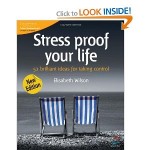 Stress proof your life is for people who struggle to find time for a shower, much less a bath. The ones who worry that stress is affecting their health and relationships. Or they would worry if they weren’t so knackered. Some people are really good at avoiding some stresses without realizing that they are slaves to another kind. Elisabeth Wilson looks at the sources – occupational, genetic and environmental – and reveals 52 brilliant techniques for creating a stress-free zone. When your batteries are blown and burnout is imminent these top tips can help you regain control.
Stress proof your life is for people who struggle to find time for a shower, much less a bath. The ones who worry that stress is affecting their health and relationships. Or they would worry if they weren’t so knackered. Some people are really good at avoiding some stresses without realizing that they are slaves to another kind. Elisabeth Wilson looks at the sources – occupational, genetic and environmental – and reveals 52 brilliant techniques for creating a stress-free zone. When your batteries are blown and burnout is imminent these top tips can help you regain control.
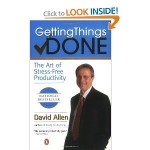 If you’re like me, my biggest source of stress comes from the pressure to get lots of things done everyday.
If you’re like me, my biggest source of stress comes from the pressure to get lots of things done everyday.
In Getting Things Done, veteran coach and management consultant David Allen shares the methods for getting things done. Allen’s premise is simple: our productivity is directly proportional to our ability to relax. Only when our minds are clear and our thoughts are organized can we achieve effective productivity and unleash our creative potential* Apply the “do it, delegate it, defer it, drop it” rule to get your in-box to empty.
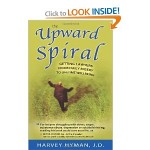 Lawyers help others but take very poor care of themselves. In their quest to max out their earning potential and afford the best material goods our economy has to offer, lawyers lead a narrow, grimly serious existence without emotional rewards. They work inhuman hours yet always feel pressured for time. Since they never stop, breathe, and relax, they are frequently tense, irritable and ready to bark. Author Harvey Hyman, himself a former trial lawyer, gives us the latest science, wit and wisdom in a book I highly recommend.
Lawyers help others but take very poor care of themselves. In their quest to max out their earning potential and afford the best material goods our economy has to offer, lawyers lead a narrow, grimly serious existence without emotional rewards. They work inhuman hours yet always feel pressured for time. Since they never stop, breathe, and relax, they are frequently tense, irritable and ready to bark. Author Harvey Hyman, himself a former trial lawyer, gives us the latest science, wit and wisdom in a book I highly recommend.
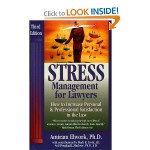 When you practice law, stress comes with the territory. Such stressors as time pressures, work overload, conflict, and difficult people can rob you of a satisfying career and personal life. It doesn’t have to be that way, however. You can take effective action and this book, written specifically for lawyers, shows you how.
When you practice law, stress comes with the territory. Such stressors as time pressures, work overload, conflict, and difficult people can rob you of a satisfying career and personal life. It doesn’t have to be that way, however. You can take effective action and this book, written specifically for lawyers, shows you how.








